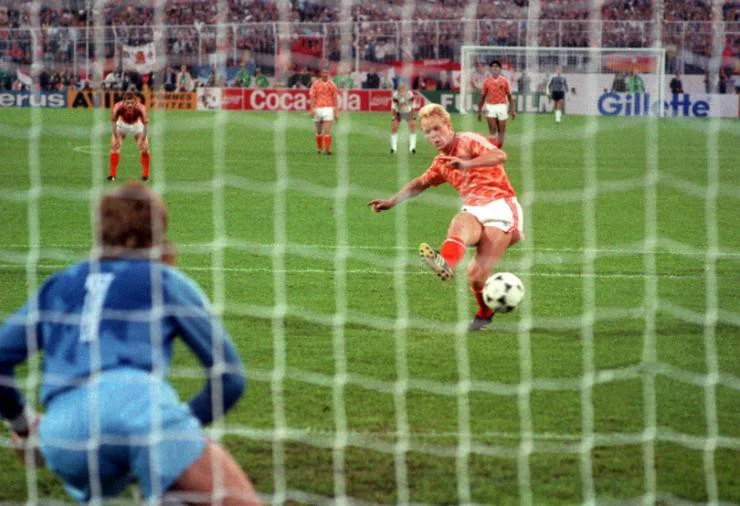On this day at the Euros, July 7: France kickstart Germany's decline in 2016
Having been knocked out in the quarter-finals of both Euro 2012 and Brazil 2014 by the eventual champions, France were presumably amused to find their last-eight opponents on this occasion were Iceland, surprise victors over England. A 5-2 silencing of the thunderclappers was, then, a pleasingly easy route to the last four – but there, monsters lurked.
Germany looms large in the French psyche: the noisy neighbour who barged over uninvited in 1870, 1914 and 1940. This time France were hosts by choice, but that can be something of a mixed feeling for a country occupied within living memory – particularly one which just eight months before had suffered the horrific Bataclan terrorist attacks, starting with suicide bombings near (but thankfully not inside) the Stade de France as France hosted, yes, Germany.
Sure, France had beaten Germany in various friendlies, but never when it mattered. Not at the Maracana in 2014, when Mats Hummels’ header sent them out in the quarters. Not in Guadalajara in 1986, when Andy Brehme and Rudi Voller sent the Michel Platini-inspired European champions home in the semis. And not four years before that in another World Cup semi in Seville, when les Bleus lost not just Patrick Battiston – hospitalised, on oxygen, three teeth lighter, by an unpunished assault from smirking German goalkeeper Harald Schumacher – but two leads gained in extra-time, losing via the World Cup’s first-ever penalty shootout.
Barring a 6-3 win in the 1958 third-place match, when Just Fontaine scored four times to complete a surely unsurpassable 13-goal Golden Boot haul, France had never beaten Germany in a competitive game. Germany were also the world champions, re-elevated to global pre-eminence by Das Reboot that had become the new blueprint for the root-and-branch reformers to admire. And who had they beaten in the 2014 semis? Brazil, the sixth time they had beaten the hosts in the semis, although not always 7-1.
Germany had also cruised through their first five games without conceding a goal except Leonardo Bonucci’s quarter-final penalty, the Italians despatched via shootout. France, by contrast, had started slowly, only winning two group games thanks to 11e-heure goals under the Paris lights.
But after a day of searing July temperatures in Marseille, France had too much savoir-faire for Germany in the cauldron of the Velodrome. And the match hinged on a rush of German blood from a most unexpected source.
MORE ON THIS DAY FOOTBALL STORIES
Captaining the side on the occasion of his 120th cap, Bastien Schweinsteiger was almost 32 and midway through the two-year Manchester United appendix to his imperious Bayern Munich story. He was making his 38th appearance in a World Cup or Euros finals, more than anyone else. But in first half added time, when a cross came in towards Patrice Evra, Schweini led with his arm to gift France a penalty which Antoine Griezmann tucked in with the last kick of the half.
Predictably and reasonably enough, Germany restarted with renewed vigour but France sat tight and soaked it up, waiting for another chance. It duly came on 72 minutes when Manuel Neuer could only half-clear (or “fumble,” if you’re not a fan) Paul Pogba’s cross to Griezmann, who stabbed in from close range to effectively eliminate the country of his father’s birth.
With focal point Olivier Giroud continuing to struggle – to the French fans’ increasingly vocal dismay – Griezmann had stepped up; after only scoring once in 10 caps during 2015, this was his sixth goal of the tournament, twice what anybody else was to manage, and more than anyone at any single Euros bar Michel Platini’s remarkable nine in 1984.
Germany being Germany, they continued to have a go – Joshua Kimmich hitting the woodwork and then watching Hugo Lloris superbly save his header – but the French players stuck to their tasks, helped by the Velodrome erupting into a spine-tingling chorus of La Marseillaise. Germany ended up with 68% possession but nothing to show for it.
Jogi Low was less than magnanimous in defeat. “In 2012 or 2010 when we went out, the other sides were better than us,” he bleated. “Today that wasn't the case. We were better than the French.” Didier Deschamps could afford more grace: “Germany were and are still the best side. We did what we needed to do. We were clinical.”
As a delighted and visibly emotional onlooker, Thierry Henry was free to put it in historical context. “A sign of a great team is that you take advantage of mistakes, you punish a team,” he said. “France did that. They were like an Italian or German side of old times: two opportunities, two goals.”
Meanwhile Germany were not like the German side of old. Sure, they had reached six consecutive semi-finals, but they had lost four of them, plus the 2008 Euros final. Even as reigning world champions – a title they would surrender meekly in Russia as group-stage wooden-spooners – they were now more thereabouts than there.
Originally published by FourFourTwo, 7 Jul 2021





